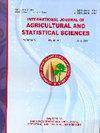Characterization of High and Stable Yield Genotype for Maize based on Multivariate stability Analysis and Prediction of Crop Yield using Ensemble Learning Techniques
IF 0.3
Q4 AGRICULTURE, MULTIDISCIPLINARY
International Journal of Agricultural and Statistical Sciences
Pub Date : 2024-06-01
DOI:10.59467/ijass.2024.20.289
引用次数: 0
Abstract
The production of maize globally surpassed the wheat and rice, because it is a staple crop in many regions of the world. Also, in addition to being directly consumed by people, maize is also used to make corn ethanol, animal food and several other products of maize, therefore the stability and high yield of maize is an extremely crucial part to promote long-term growth and food protection. This study looked at the effects of G ? E interaction on yield stability in 23 hybrids of maize in 53 distinct Indian environments. On the basis of analyses of variance, stability tests for multivariate stability parameters were carried out. In terms of all characteristics, the genotype and environment (G ? E interaction) differences were highly significant (p < 0.01), according to the pooled analysis of variance. A GGE biplot was created with the two principal components, which accounted for 66.02% and 8.51% variation in GEI for the corresponding yield per hectare. The GGE biplot and AMMI model exposed genotypes SYN916801, Bio 9682, DKC 9215, NMH 4313 as good with an indication of high mean yield and stability within the environment that were tested. By the results, we suggest breeding might boost output yield, and also the identified genotypes may be suggested for commercial farming. Also, for the creation of successful agricultural and food policy, reliable crop production estimates are essential. So, examinations were made on the machine learning techniques such as random forest and Gradient Boosting algorithm to predict crop yield responses in maize. While assessing statistical performance, GBM was found highly capable of predicting yield as compared to RF. Result showed that GBM is a good and adaptable machine learning technique for yield predictions.. KEYWORDS :Additive main effect and Multiplicative interaction, G ? E interaction, Machine learning techniques, Gradient boosting machine, Random forest.基于多变量稳定性分析的玉米高产稳产基因型特征以及利用集合学习技术预测作物产量
玉米在全球的产量超过了小麦和水稻,因为它是世界许多地区的主要作物。此外,玉米除了直接供人们食用外,还可用于制造玉米乙醇、动物食品和其他一些玉米产品,因此玉米的稳定和高产是促进长期增长和保护粮食的极其重要的一环。本研究考察了 G ?E 交互作用对 53 种不同印度环境中 23 种玉米杂交种产量稳定性的影响。在方差分析的基础上,对多变量稳定性参数进行了稳定性测试。根据集合方差分析,在所有特征方面,基因型与环境(G ? E 交互作用)的差异都非常显著(p < 0.01)。利用两个主成分绘制了 GGE 双图,这两个主成分分别占相应公顷产量的 66.02% 和 8.51%。GGE 双图和 AMMI 模型显示,基因型 SYN916801、Bio 9682、DKC 9215 和 NMH 4313 在测试环境中平均产量高且稳定性好。根据这些结果,我们认为育种可能会提高产量,所确定的基因型也可用于商业化种植。此外,要制定成功的农业和粮食政策,可靠的作物产量估计至关重要。因此,我们对随机森林和梯度提升算法等机器学习技术进行了研究,以预测玉米的作物产量反应。在评估统计性能时,发现 GBM 与 RF 相比,预测产量的能力更强。结果表明,GBM 是一种适用于产量预测的良好机器学习技术。关键词:加法主效应和乘法交互作用、G ?E 交互作用 机器学习技术 梯度提升机 随机森林
本文章由计算机程序翻译,如有差异,请以英文原文为准。
求助全文
约1分钟内获得全文
求助全文
来源期刊
自引率
66.70%
发文量
4
期刊介绍:
Information not localized

 求助内容:
求助内容: 应助结果提醒方式:
应助结果提醒方式:


